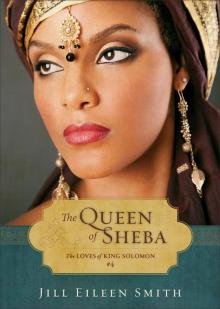- Home
- Jill Eileen Smith
The Queen of Sheba
The Queen of Sheba Read online
© 2017 by Jill Eileen Smith
Published by Revell
a division of Baker Publishing Group
P.O. Box 6287, Grand Rapids, MI 49516-6287
www.revellbooks.com
All rights reserved. No part of this publication may be reproduced, stored in a retrieval system, or transmitted in any form or by any means—for example, electronic, photocopy, recording—without the prior written permission of the publisher. The only exception is brief quotations in printed reviews.
ISBN 978-1-4934-0020-1
Unless otherwise indicated, Scripture quotations are from The Holy Bible, English Standard Version® (ESV®), copyright © 2001 by Crossway, a publishing ministry of Good News Publishers. Used by permission. All rights reserved. ESV Text Edition: 2011
Scripture quotations marked NIV are from the Holy Bible, New International Version®. NIV®. Copyright © 1973, 1978, 1984, 2011 by Biblica, Inc.™ Used by permission of Zondervan. All rights reserved worldwide. www.zondervan.com
This is a work of historical reconstruction; the appearances of certain historical figures are therefore inevitable. All other characters, however, are products of the author’s imagination, and any resemblance to actual persons, living or dead, is coincidental.
Published in association with the Books & Such Literary Agency, Wendy Lawton, Central Valley Office, P.O. Box 1227, Hilmar, CA 95324, [email protected].
To truth seekers everywhere, especially those
who do not stop until they find Him.
Contents
Cover
Title Page
Copyright Page
Dedication
Epigraph
Prelude
1
2
3
4
Interlude
5
6
7
8
9
10
Grace Note
11
12
Postlude
Note to the Reader
Acknowledgments
Sneak Peek of Redeeming Grace
About the Author
Books by Jill Eileen Smith
Back Ads
Back Cover
Now when the queen of Sheba heard of the fame of Solomon concerning the name of the LORD, she came to test him with hard questions. She came to Jerusalem with a very great retinue, with camels bearing spices and very much gold and precious stones. And when she came to Solomon, she told him all that was on her mind. And Solomon answered all her questions; there was nothing hidden from the king that he could not explain to her.
1 Kings 10:1–3
Prelude
For fifteen summers since my birth, I had been groomed for the moment the scepter would rest in my hands. I simply had not expected it to come when it did. My mother, Makeda, Queen of the South, died suddenly one evening after a night of feasting. I woke to the sound of her maids shouting the news—far before I was ready to lose her. Or to rule so vast a kingdom alone in her stead.
But alone was exactly what I was then, and still remain, for the kingdom of Sheba takes great pride in their virgin queens. The furtherance of our dynasty comes through adoption, normally of a female child, but now and then a man-child is chosen when no suitable girl can be found. I had yet to find either, for the infant girl I had adopted in my twentieth year died of an unexpected plague before her fifth birthday. Ten years later, I have not had the heart to replace her, though my vizier and the nobles in my inner circle remind me of my duty weekly. I weary of the thought.
Perhaps my disillusionment comes from fear of loss or never having known my true parents. Whoever birthed me mattered little once I, Nicaula Bilquis Makeda, was chosen as Makeda’s heir. All eyes of the kingdom turned to me the moment my mother’s body rested in the netherworld.
I did not know how hard the task would be during those early years, or how fast time would carry me as I sought to establish a kingdom to rival that of foreign kings. A kingdom that would send me in constant search of answers to impossible questions.
And now, after fifteen years as queen, I find I still seek answers to those questions. But I did not expect them to lead me on an adventure that would take me far from my homeland.
Queens simply did not leave their kingdoms for a quest. And yet, that is exactly what I did.
1
Sheba, 953 BC
The air in the audience chamber where I ascended my throne bore a sticky feel, despite the scent of the pleasing frankincense burning in the sconces. The summer rains would be upon us soon, yet I already felt sweat trickle beneath the weight of the golden crown as I took my seat. Slaves lifted heavy palm fronds to cool the air—a welcome respite. I smoothed my elaborate gown and matching gold and purple robe, then took the scepter from my vizier, who waited patiently to sit at my right.
Najib was a comely man, one I had considered a near equal, one who could make a mother of me—if the law allowed it. How was it that my next in line for the throne could marry and bear children while I, Sheba’s queen, must remain barren and unloved? I ignored the ache to my middle that such thoughts evoked and nodded, unsmiling, in Najib’s direction.
“Did you rest well, Najib?” I asked as the buzz of my courtiers’ voices filled the chamber. He normally did not speak to me until I spoke first to him. It was custom. And we always followed custom.
“Yes, my queen.” His mouth twitched into a half smile. A striped turban adorned his dark hair, and a blue robe with golden threads cloaked a trim body. The robe gave status to his role as my underling and heir apparent—at least until such time as I chose a child to follow in my stead. “Have you given any thought to the candidates brought to you a fortnight ago?”
The question was one he asked almost daily now, but I had commissioned him to search for another young female I could adopt. Ten years was long enough to grieve, at least as far as my advisors were concerned.
I met Najib’s gaze with a glance I could not hold. “No. I have not had time to meet the candidates.” The truth was I had no heart to tear an infant from her mother. And the unwanted children who roamed the halls of the temples to our gods either were too old or had been handpicked to be priestesses. My healthy fear of angering the gods kept me from choosing one from the temple grounds.
“You really must consider someone soon, my queen. The advisors are growing restless.” Najib spoke truth, for I had seen the looks of impatience, yet still I put them off, claiming it was my right to do so.
“What? I should think you would be glad to be the one to rule after me if no one is chosen.” I mocked him with my tone, but I knew by his look that even he did not wish to go against the ruling council who oversaw the goings and comings of Sheba’s monarchs.
“At the rate you are waiting to choose, my queen, should anything happen to you—may the gods forbid it—I myself will be in my grave before this child is old enough to handle matters on her own.” He stroked a narrow beard that was not truly a beard. His chin looked like that of a goat more than a man, but it was his preference, so I said nothing.
“I will choose soon,” I said, feeling suddenly cross over it all. Besides, I still entertained a crazy notion of bearing a child for the sake of love. It went against all of Sheba’s protocol, but hadn’t such things been written of in our poetry and sung in our songs? Why was our monarch the only one who looked with longing on the idea of love yet was denied its very pleasures?
This question was only one of many that plagued me in the quiet moments of the night, or when I stood on the latticed balcony of my rooms and stared up at the lush mountains and waterfalls in the distance, wondering how such beauty had come into being. Were the gods of my people, t
he sun and moon and creatures of the earth, to be worshiped for such magnificence? When I gazed at the heavens and pondered, I felt only confusion. For despite the legends of Astar, the sun goddess, and Sin, god of the moon, I saw them more as heavenly beings than the powerful creators of good and evil others claimed them to be.
A commotion at the end of the audience chamber drew my attention away from my troublesome thoughts. Hadi, my lead war general, approached the throne. I extended the scepter. He touched its tip and bowed low.
“What news do you bring to me, Hadi?”
He rose up on one knee but did not look up. “I have news from the north,” he said.
“You may rise and speak.”
He did so and nodded. “The king of Israel has sent a fleet of ships to the narrow passage of the Red Sea, near our ports. He has sent servants into our lands on the western shore to search for gold and baboons and spices and more.” He paused, and I knew he held back more than he was telling me.
“Why would he do such a thing? Why not simply send to me and request these things? We have hunters and miners who search for gold and jewels and those who grow and cultivate the precious oils. For a price, he can have all he wants. Surely this king of peace, of which I have heard, is not looking to start war with our own peaceful kingdom?” I narrowed my gaze at him, my mind churning. Why would King Solomon not send ambassadors to meet me? If he wanted an alliance, he certainly knew how to get such a thing, if the rumors were true.
“I do not know, my queen. Obviously, either King Solomon thinks these lands fall under his rule—perhaps one of his other alliances has misled him—or he does not realize how vast a kingdom you command.” Hadi dipped his head, and when he met my gaze again, I saw the look of determination there. “If you let me, my queen, I will take men and meet his ships and confront his captain. If need be, I will travel to Israel myself and speak to the king on your behalf.”
“We have ambassadors for that, Hadi. I am not looking to start a war by sending my general.” I stroked the scepter with one finger, the questions racing again through my mind. Solomon, supposedly the wisest of kings, should know the size of my kingdom. No, this was more than that. He was attempting to provoke something from me. But what?
Hadi cleared his throat and I blinked, realizing my distraction. “We did not know until now that King Solomon had built a fleet of ships to gather the spices and gold and animals he craves. I fear, my queen, that he will take what is ours and use it in trade with distant northern lands, replacing our camel caravans. Ships move much faster than camels, for the route is safer, almost uncontested.”
I considered his words. There was no possible reason that Solomon would ignore my sovereignty. He had to know the boundaries of our lands, which spread from the south of Arabia to its tip, across the narrow channel of the Red Sea, and west, encompassing African lands. “Tell me what else you know about this king.”
I had heard the rumors, of course. Solomon had built up Jerusalem and its surrounding cities with enormous buildings and palaces and stables for his chariots and horses. One of his wives, from Egypt, had a palace of her own, while others lived in opulent buildings fit for the princesses they were. But the most prominent rumor, the one I had pondered on my bed in the night, was of his wisdom. They said he was the only one who understood the riddles of the world, the riddles of the human heart. If he was truly so wise, why would he seek to incite my kingdom?
“You know, of course, my queen,” Hadi said, standing stiffly at attention, “that it is said King Solomon is the wisest of men, that he understands the riddles of the gods.”
“Of the gods too?” Would the exaggerations of his wonders never cease?
Hadi nodded. “He is also the most ambitious of kings in all the east.” He met my gaze beneath a shock of dark bangs showing below his bronze helmet.
“No one understands the gods or their ways, Hadi.” I challenged him with a look, but at the same time, my heart beat faster.
“Yes, my queen. But people have come from far and near to hear him speak about plant life, from the cedar of Lebanon to the hyssop that grows out of walls. They say he also teaches about animals and birds, reptiles and fish. They say his wisdom exceeds any man or woman in all the east and that it is his god who has given him this treasure.”
I looked briefly away at my court, then met Hadi’s gaze once more. “You have become quite smitten with what these people say.” I stared him down, waiting for him to admit that his sources were simple gossips spinning a wild tale. I wanted him to tell me that my heart was wrong, that the longing to hear this man was foolish. But my commander did not flinch. I sat straighter and lifted one sculpted brow.
“I would not lie to you, my queen.” If he was affronted by my words, he did not show it. I glanced at Najib, but he simply shrugged. The rumors surely had reached him as they had me, but neither of us had spoken of this king in more than amusing terms. There had been no need to until now. Now that his ships were invading our ports.
“Well, it seems that King Solomon has made one foolish choice,” I said, sitting straighter. “His ships have entered the waters of our land without seeking my approval. Perhaps this king thinks a kingdom ruled by a woman is of little consequence?”
Hadi stood still a moment, as though not sure he should respond, but at last slowly shook his head. “My queen, I doubt that he has come in contact with any kingdom such as ours. His alliances with foreign kings have included marriage to many princesses . . . if the rumors are true.” He paused and I waved him on. “Though he is said to have married more women than is prudent—”
“A mark of a fool for certain.” I smiled, convinced I had made my point well enough.
Najib laughed softly and Hadi’s lips curved upward. They respected me enough to know my feelings about any man who saw a woman as someone to adorn an arm or fill a bed or beget children—despite my hidden desire for one man’s exclusive love. I was surely the foolish one to want something I could not have. But I did not say so.
“Yes, my queen, but the truth remains. Foolish or wise, Solomon has determined to take a risk and sent his ships to rest near our ports on the west side of the sea, and his men are scouring those lands even as we speak.”
I studied Hadi, gauging his mood, my mind whirling. I had never been faced with such a situation. We were a peaceful people. No one had ever attempted to take what we sold so willingly. What motivated this foreign king to pursue even more than he’d been given? For the rumors also told of his great wealth, to the point that I could not fathom such a thing. Silver as common as stones? Impossible! And yet, the questions continued. How? Why?
“What would you have us do, my queen?” Hadi looked to me, but he glanced briefly at Najib as though one person alone could not handle this problem. Or perhaps one woman alone.
“I have no intention of going to war with this man, Hadi. Sheba is a kingdom of peace, and I intend to keep it that way.”
Hadi nodded. “Perhaps we can send the ambassadors then, to explain his violation and garner a trade agreement. I could take a select number of soldiers to make our point.” His eyes glistened at the thought, and I wondered if he was anxious to fight such a powerful man, which could only end up with Hadi at the end of a stake.
I shuddered and looked at him as the voices of courtiers droned beyond me. Najib tapped one foot—an annoying habit—and I caught the motion in my peripheral vision. I gave him a withering glance. He stopped.
I stroked my chin with one long finger and looked from one man to the other. What I wouldn’t give for some wisdom now, to know how to approach this extravagant king and garner the trade agreement Hadi suggested. I sensed Solomon would not be easily persuaded. He would want a wife from among our people to seal our contract, and I had no desire to add to his ever-increasing harem.
Hadi shifted his weight from one foot to the other, but otherwise he showed no impatience with my silent pondering.
“Which god does he serve?” I asked at last. �
�If his god is so powerful, perhaps we can appease him to gain some of this wisdom for ourselves.”
“They rarely use his name, my queen, but in my travels I have heard an Israelite or two quote their call to prayer, their Shema, which says, ‘Sh’ma, Yisra’el! Adonai Eloheinu, Adonai echad.’”
I don’t know why, but I shivered as the words fell from Hadi’s lips. The buzz of voices around the throne room silenced, as though we were all held under a deep spell simply by hearing this call to worship and prayer to Solomon’s god. Though the language of our tongues differed slightly, I understood the meaning. Hear, Israel, Adonai our God, Adonai is one.
My whole being felt a sudden, joyous peace I couldn’t explain. Hadn’t I grown up worshiping sun and moon and beasts and stars? Yet I had never felt such peace in doing so.
“It is time I met this king,” I said, surprising myself and wondering at my own sanity as I listened to the gasps throughout the room.
“Meet him, my queen?” Hadi’s look told me he too thought me mad. “Surely a trip from our ambassadors would suffice.”
Of course he would expect me to take his suggestion. What queen had ever traveled from this land to another country? What queen had ever left her rule to an underling? None. And my suggestion was ludicrous even to my own ears.
“We will send a servant with Solomon’s ships to announce our coming arrival, and our ambassadors may join me,” I said, refusing to back down despite my own sudden misgivings. “But I will travel to him. Arrange a caravan of camels. We will need to gather many gifts.” If Solomon were to join in an agreement, he would need appeasing, despite what he already possessed or had possibly already taken from my lands. I would give him those rare spices that he seemed anxious to claim, and more—gold and jewels and . . . my questions. Surely the wisest man in all the earth would enjoy sparring with an equal. And no doubt he had never met an equal of my caliber, for this was the era of kings, not queens. The anomaly of my existence alone should intrigue him. Perhaps in return, he would answer the questions that even my priests found vexing.

 Star of Persia: Esther's Story
Star of Persia: Esther's Story The Shepherdess
The Shepherdess Abigail (The Wives of King David Book #2): A Novel
Abigail (The Wives of King David Book #2): A Novel The Queen of Sheba
The Queen of Sheba Michal
Michal Rebekah
Rebekah A Passionate Hope--Hannah's Story
A Passionate Hope--Hannah's Story Daughter of the Nile
Daughter of the Nile Rachel
Rachel Sarai
Sarai Redeeming Grace: Ruth's Story
Redeeming Grace: Ruth's Story The Desert Princess
The Desert Princess The Prophetess - Deborah's Story
The Prophetess - Deborah's Story